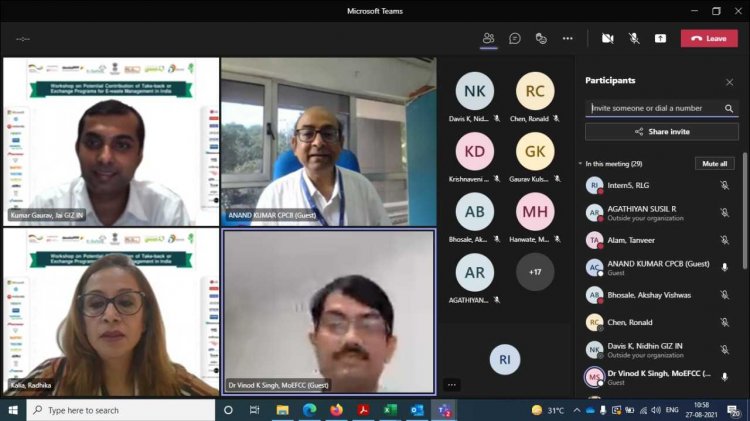Setting Up Innovative Value Chain “E-Safai’’ for e-Waste Management

Bangalore: RLG India and Deutsche Gesellschaft für Internationale Zusammenarbeit (GIZ) GmbH, a federally-owned enterprise on behalf of the German Government, are jointly implementing a three-year-long Development Public Private Partnership Project titled “Setting Up Innovative Value Chain for e-Waste Management” also known as “E-Safai” initiative. The project aims to promote the take-back or exchange programs for e-waste management in India.
Several companies are supporting take-back or exchange programs for the disposal of e-waste from consumers to Producer Responsibility Organizations (PROs) and formal e-waste recyclers. These programs also serve as marketing strategies for the companies as the customers can be provided with discount coupons in exchange for e-waste which can be used for the purchase of new electronic items. The main objective of the project E-Safai is to spread awareness about the importance of the take-back mechanism and how these programs could contribute towards building a healthy environment for all.
RLG India and GIZ organized a virtual workshop on “Potential Contribution of Take Back or Exchange Programs for E-waste Management in India''. The workshop included inputs from key stakeholders including officials from the Ministry of Environment, Forest and Climate Change (MoEFCC), the Central Pollution Control Board (CPCB) and industry representatives. Stakeholders including brands and recyclers shared their experiences of implementing take-back or exchange programs. They highlighted the potential benefits, challenges, and possible measures to address these issues. The workshop also served as a platform for stakeholders to convey their concerns to the policymakers regarding the implementation of take-back or exchange programs.
Talking about the project and the workshop conducted, Ms. Radhika Kalia, Managing Director, RLG India, said, “E-Safai is a transformative step towards creating good infrastructure for e-waste management. We are consistent in cultivating innovative ideas and ways to deal with the challenges of safe e-waste recycling.”
Sharing his insights on the project and workshop, Dr. Ashish Chaturvedi, Director-Climate Change, GIZ India, said, “The formal e-waste management sector has great potential for sustainable recycling of e-waste. The E-Safai initiative is committed to building a better and cleaner India by supporting the formal e-waste recyclers in their endeavors. The take-back and exchange programs not only benefit the consumers but also the stakeholders and the companies adopting these programs.
Shri Anand Kumar, Divisional Head, CPCB while delivering the special address, highlighted that involving informal sector stakeholders will play a significant role in achieving the targets under EPR and in enhancing the effectiveness of the take back/exchange programs. He stated that it will also provide livelihood options for the unorganized sector stakeholders.
Dr. Vinod Kumar Singh, Scientist E, HSM Division, MoEFCC said that the government introduced Extended Producer Responsibility (EPR) which makes producers liable to collect 30 percent to 70 percent (over seven years) of the e-waste they produce. However, under the COVID circumstances, collection targets were reduced from 40% to 20% for the financial year 2020-2021.
Dr Sandip Chatterjee, Director/Scientist, ‘F’ Ministry of Electronics and IT during the special address highlighted that cost-effective recycling technologies will help the transition to a circular economy in India. He described various capacity-building initiatives of the Ministry such as Diksha-e-learning platform and various awareness campaigns under greene.gov.in led by the ministry.
Mr Shikhar Jain, Principal Councilor, Confederation of Indian Industries (CII) highlighted that inter-ministerial coordination among MoEFCC, MeiTY and Ministry of Commerce and Industry will be also needed for effective e-waste management. He also stated that CII is happy to partner with the E-Safai project for more consultations.
Mr. Somesh Agarwal, President, Haier highlighted that success of take back programs will depend upon the awareness among consumers and establishing a network of the collection centers.
Mr. Gaurav Kulshresta, Senior Manager, Pioneer also highlighted that brands could play a crucial role in generating awareness and it will help to overcome the hesitancy among consumers to deposit e-waste to collection centers.
Ms. Ashwini N J, Manager, Epson highlighted that the government can also support the brands in the awareness campaign and promoting takeback and exchange programs.
Mr. Rishabh Maheshwari, Manager, Oppo stated that PROs can play a crucial role in assisting the brands in integrating the promotion of ‘Exchange/take back programs’ along the regular sales and marketing efforts.















































